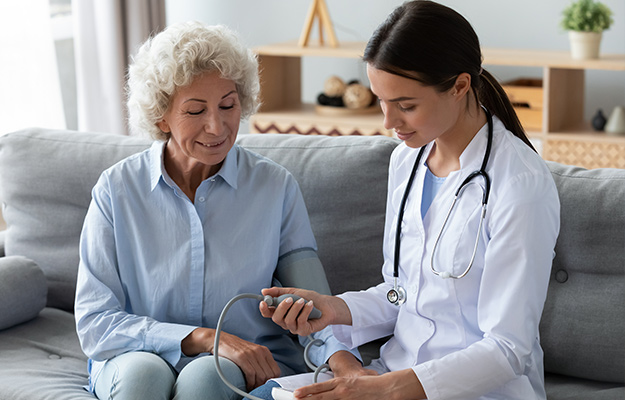Hormone replacement therapy (HRT) has long been well-recognized as an efficient approach to treating the symptoms of menopause in women.
However, although many women experience the impact of menopause, not everyone is taking the therapy – Only 38% of women who need hormone interventions in the United States resort to treatment.
For this reason, an expert consensus conference took place in Orlando, Florida, on April 24, 2017. The event provides healthcare professionals offering hormone therapy with a prudent rationale regarding low testosterone in women.
Learn About Low Testosterone in Women From Hormone Therapy Experts
Testosterone Levels Do Not Correlate With Symptoms
Normal Testosterone Levels Do Not Apply to Every Woman
Like men, women also have testosterone at a much lower level.
This hormone is vital for men and women alike. Maintaining sexual health, promoting growth, repairing the reproductive tissues and bone mass, and so on – testosterone plays a massive role along with estrogen in shaping the femininity and well-being of women.
However, although there is widespread agreement that the normal testosterone levels in women are from 15 to 70 ng/dL, this range does not apply to everyone.
It is because testosterone levels in women vary from time to time depending on multiple factors, including stress, sleep, exercise, insulin levels, and more. Also, testosterone, along with other sex hormones like estrogens, fluctuates heavily during the menstrual cycle, making it even harder to determine the normal hormone range.
This rise and fall in testosterone are why doctors prefer to follow average hormone values rather than normal ranges.
A Poor Correlation Between Testosterone Levels and Symptoms
The consensus conference also highlighted that those with lower testosterone levels do not necessarily experience more severe symptoms of testosterone deficiency.
When a deficiency exists, women may have different hormone statuses. This variation in hormone levels is due to the multifactorial fluctuation mentioned above. So a lower score on a test does not indicate it will result in more complications.
Because of this, the conference concluded it is impractical to determine a biochemical definition for female testosterone deficiency. Instead, experts define the condition through a set of symptoms, including:
- A diminished sense of well-being or dysphoric mood
- Persistent, unexplained fatigue and lethargy
- Sexual function changes, including decreased libido, sexual receptivity, and pleasure
Testosterone Deficiency May Occur Anytime During Adulthood
Testosterone Levels in the 40s Are Half That of the 20s

To draw a clear picture of how testosterone diminishes with age, scientists demonstrated an age-related decline in the hormone among women between the age of 20 to 49.
They found that by the time a woman reaches age 40, her average testosterone levels will have dropped significantly to half that of a 21-year-old. Not only that, this plummet will continue to go downhill afterward at nearly the same rate as before 40.
This hormone slump is concerning, especially when compared to men. While testosterone in women is equally important as in men, it declines faster. Men preserve their testosterone by around 75% at 40 and only witness a modest drop of 1% annually. This statistic explains why women end up on the other, more urgent side of the tightrope.
Testosterone Deficiency Is Underdiagnosed in Young Women
Despite being in the thick of testosterone declines and consequent deficiencies, many young women are underdiagnosed and become victims of the condition.
This lack of awareness results from the fact that the symptoms of low testosterone in women are nonspecific, not to mention many people lack understanding about them. Fatigue can be multifactorial, a diminished sense of well-being may result from anything, and changes in sexual functions can result from a psychological or relationship problem.
Research shows that up to 80% of women experience low testosterone, but only over 30% know about menopause, and around the same proportion take therapy.
Therefore, the conference emphasized that young women with the following conditions may be more vulnerable to testosterone deficiency and should request an intervention:
- Hypothalamic amenorrhea
- Premature ovarian failure
- Oophorectomy
- Premenstrual syndrome
- Acquired immunodeficiency syndrome
- Adrenal insufficiency
- Hypopituitarism
- On certain medications (oral estrogen, contraceptives, or corticosteroids)
Testosterone Therapy Can Be Breast/Cardio/Brain Protective
Testosterone Therapy and Breast Cancer Risks
Hormone therapy is associated with increased breast cancer risks because the combined estrogen/progestogen in the treatment promotes the proliferation of breast cells.
A breast cancer cell can bind to an estrogen molecule through an estrogen receptor. If this binding occurs, estrogen will fuel breast cancer growth. Although not every breast cancer is estrogen-sensitive, 2 out of 3 cases are vulnerable.
This stigma is why women are reluctant to take hormone therapy. But, eventually, they have a clue, as breast cancer risks increase if the treatment is long-term.
However, adding testosterone to an estrogen/progestogen regimen controls the stimulatory effects on breast cancer. Testosterone is an antagonist to estrogen and has been used to treat breast cancer and other estrogen-sensitive diseases, including:
- Breast pain
- Chronic mastitis
- Endometriosis
- Uterine fibroids
- Dysfunctional uterine bleeding
Although testosterone is breast-protective, it can convert back to estrogen through aromatization, resulting in secondary effects on breast cancer. Thus, testosterone usually comes with aromatase inhibitors, a class of drugs that reduces estrogen conversion.
Testosterone Therapy and Cardiovascular Risks

Testosterone at physiologically high levels may protect against cardiovascular diseases in postmenopausal women. Testosterone is cardio-protective by:
- Improving blood flow to the coronaries
- Improving lipid profiles
- Reducing atherogenic inflammatory markers
Indeed, findings show that testosterone levels correlate inversely with atherosclerosis, as those with the highest testosterone levels have the lowest risk. Also, both males and females react positively to testosterone’s vasodilator effects that prevent clot formation.
Meanwhile, a deficiency may otherwise increase the risk. For example, low testosterone in women predicts decreased exercise capacity and poor clinical outcomes in heart failure.
Testosterone Therapy and Alzheimer’s Disease Risks
Similar to estrogen, testosterone has brain-protective properties. By lowering neuronal cell death and increasing resistance to Alzheimer’s disease, testosterone prolongs the life of neurons and inhibits the formation of beta-amyloid.
In a study on the effects of a single testosterone dose on spatial cognition and brain activity, the testosterone-treated group performed better on the MRT (mental rotation task) than the placebo group. Another study found that vocabulary, learning, and memory scores improved after 26 weeks of testosterone spray.
On the other hand, low testosterone in women increases the risk of Alzheimer’s disease. Also, studies have shown a correlation between low testosterone and poor spatial memory and navigational skills.
Testosterone Therapy Benefits Outweigh Side Effect Risks
Due to the lack of an FDA-approved product, many experts have hesitated to provide hormone therapy for low testosterone in women.
However, the conference presented a plethora of data about the problems that cannot be disregarded. General health issues such as breast cancer, cardiovascular disease, and cognitive decline have highlighted the need for preventive healthcare for women, with hormone therapy appearing to be the leading contender.
There are still various obstacles to consider, one of which is the uncertainty of controlling the side effects. However, it does not necessarily result in a reluctance to take hormone therapy. On the contrary, testosterone therapy benefits should be a priority over the side effect risks as long as an appropriate, personalized regimen is practical.
Bottom Line
Overall, the 2017 expert consensus conference has defined fundamental principles based on the best available evidence and provided a scientific framework for practitioners to treat testosterone deficiency in women.
This conference clarified the tremendous public and scientific confusion regarding low testosterone in women. The initiative has also removed the barriers to increasing the quality of life and care in women’s well-being.
Yunique Medical provides FUNCTIONAL MEDICINE for optimized health and performance. We offer customized, scientifically advanced treatments to create a new state of human thriving. Why be ordinary when you can be optimal?
HUMAN 2.0 begins here!
Contact us to schedule your FREE consultation at one of our three locations in Florida – Ocala, Fruitland Park (The Villages), and Daytona.
UP NEXT:
- What Does Testosterone Do for Women?
- Starting & Stopping Hormone Replacement Therapy | Risks & Side Effects
- The Importance of Testosterone Replacement Therapy in Women Suffering From Sexual Dysfunction

